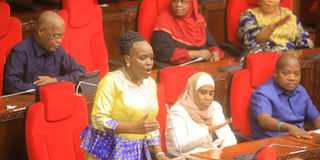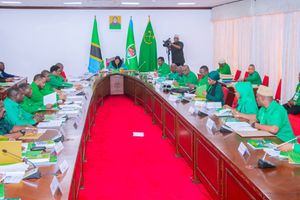Prime
Professors in Parliament query education quality as budget passes

Kasulu Urban MP Joyce Ndalichako speaks when Parliament debated the Education, Science and Technology ministry’s 2024/25 budget proposals in Parliament in Dodoma on May 8, 2024. PHOTO | EDWIN MJWAHUZI
What you need to know:
- Amidst the approval of the budget, prominent figures, including professors who are also Members of Parliament, voiced their dissatisfaction and offered suggestions for improving the education landscape in the country
Dar es Salaam. The Ministry of Education, Science and Technology on Wednesday secured a budget of Sh1.96 trillion for the fiscal year 2024/25, marking a significant step forward in addressing the challenges facing Tanzania’s education system.
The approval of the budget comes at a crucial time as concerns about declining education quality continue to spark debates nationwide, including from veteran professors in Parliament.
Members of Parliament lauded the government’s efforts through the Ministry of Education to tackle the pressing issue of dwindling education standards.
However, amidst the approval of the budget, prominent figures, including professors who are also Members of Parliament, voiced their dissatisfaction and offered suggestions for improving the education landscape in the country.
Prof Palamagamba Kabudi (Kilosa-CCM) emphasised the importance of indigenous knowledge and proposed the establishment of centres for indigenous knowledge within universities.
Drawing inspiration from countries like India and China, he stressed the need to learn from their examples in promoting traditional wisdom alongside technological advancements.
Echoing similar sentiments, Prof Sospeter Muhongo (Musoma Rural-CCM), highlighted the necessity of international benchmarking to ensure Tanzania’s competitiveness in the global educational arena.
He advocated for Tanzania’s participation in programmes like the Program for International Student Assessment (PISA) and the Trends in International Mathematics and Science Study (TIMSS) to evaluate students’ skills and knowledge on a global scale.
Moreover, concerns were raised regarding the lack of international exposure within Tanzanian universities. Prof Muhongo highlighted the importance of exchange programmes for students and lecturers to bring in diverse perspectives and enrich the academic environment.
Former Minister for Education, Prof Joyce Ndalichako (Kasulu Urban-CCM), underscored the crucial role of teachers in curriculum implementation and stressed the need for continuous training to enhance their effectiveness.
She also addressed the shortage of teachers nationwide, calling for concerted efforts to recruit and distribute them equitably across schools.
“The effectiveness of implementing new curricula will go hand in hand with the presence of capable and appropriately knowledgeable teachers regarding that curriculum. Therefore, in-service training for teachers should be continuous,” she said.
“Quality education requires an adequate number of competent teachers, appropriate facilities and infrastructure to implement the curriculum effectively in the practical education stream.
“The effectiveness of implementing this curriculum will depend heavily on teachers’ skills and the presence of materials to enable students to carry out practical training.”
She said despite the vocational education programme, there is still a significant challenge of a shortage of vocational teachers. “So, I urge the government to have a specific plan for preparing teachers for the vocational education stream.”
Prof Patrick Ndakidemi (Moshi Rural-CCM), highlighted the challenges posed by lecturer shortages in Tanzanian universities, which have significantly impacted the quality of education.
He urged the government to address this issue promptly to maintain positive momentum in the education sector.
“The significant shortage of lecturers has led to a significant decline in service delivery within universities, thus affecting quality. This is an issue that the government needs to consider to reflect the positive direction of our education,” he said.
Further concerns were raised by Prof Shukrani Manya (Nominated-CCM) regarding the inadequate infrastructure and resources within universities, hindering the delivery of quality education.
He highlighted overcrowded classrooms, insufficient laboratory facilities and inadequate student-to-lecturer ratios as pressing issues that need urgent attention.
He gave an example of the University of Dar es Salaam, where laboratories meant to serve 20 students now cater to 200 to 300 students.
“Under these conditions, the intended quality in practical training education cannot be achieved.”
Prof Manya also mentioned that one lecturer often finds themselves with a class of 800 to 1000 students, emphasising that the student-to-lecturer ratio was an international benchmark for measuring university quality.




